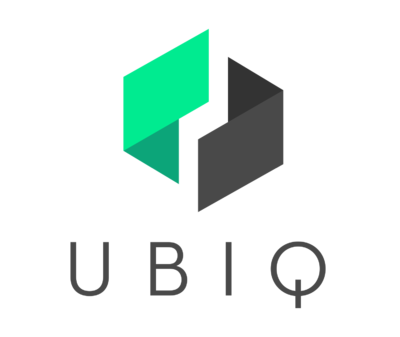Ubiq

Ubiq (UBQ) is a decentralized platform which allows the creation and implementation of smart contracts and decentralized applications. Built upon an improved Ethereum codebase, the Ubiq blockchain acts as a large globally distributed ledger and supercomputer, allowing developers to create decentralized and automated solutions to thousands of tasks which today are carried out by third party intermediaries.
Ubiq (UBQ) is the internal coin of the decentralized platform, which is a fork of Ethereum. This means that the platform Ubiq allows users to create smart contracts and decentralized applications, which will be automatically executed, thus excluding the participation of intermediaries. You will say that there is nothing new in this, and Ethereum has done a great job with such features. But, it’s not quite so, the Ubiq blockchain has an advanced code that serves as a” global computer”, which gives certain features.
Contents
Ubiq Review
The Ubiq (UBQ) team wrote on their website: After 6 months of open testing, the UBIQ network is ready to launch. We are glad to open participation for all users in blockchain development, mining and financial sphere.
January 28, 2017 is the day of creation of a new blockchain and transition from the current jumbucks blockchain to UBIQ blockchain, which is based on Ethereum. The new blockchain will allow us to fully unlock our capabilities with the help of smart contracts, will give much more space to create applications, while maintaining the value and stability of the already established 3-year market.
The UBIQ development team is committed to providing the most stable, flexible and working platform for enterprise-level application development. This is achieved through comprehensive monitoring, testing and improvement of various blockchain technologies available at the moment.
Ubiq coin – UBQ
At the moment, the Ubiq cryptocurrency is represented on 3 exchanges, but 96% of trading takes place on Bittrex. The cost of Ubiq, we indicated in bitcoins, as it is for this crypt that you can buy it on exchanges. To store coins and tokens issued on the basis of Ubiq, the developers have created their own wallets.
Ubiq price
Ubiq Mining
The Ubiq blockchain generates blocks using a proof-of-work system with a target average blocktime of 88 seconds. The algorithm used for proof-of-work, Dagger Hashimoto, is the same that is used for Ethereum and Ethereum Classic, however, the longer average block times decreases the growth size of the DAG used to represent the blockchain, enabling lower end (as of 2017) with 2GB of RAM to operate on the chain for over 6 years. In addition, Ubiq integrates a new difficulty adjustment algorithm, Flux and was the 96th largest digital currency by market capitalization.
The price of the native token reached an all-time high of over $3.00 on 30 Aug 2017.
- UBIQ.cc
- Ubiq Explorer
Decentralized Applications (dApps)
- Mining and Initial Coin Offering review services: APX Ventures
- Token-based prepaid debit cards: QWARK
- Cryptopia exchange utility and share tokens: DOT and CEFS
Ubiq Wallets
Cryptocurrency wallets that support Ubiq:
- Pyrus – Open Source Web Wallet (Forked off of MyEtherWallet)
- Pyrus CX – Chrome-based open source Web Wallet
- Fusion Wallet – go-ubiq (Forked off of go-ethereum): https://github.com/ubiq/fusion/releases
Monetary Policy
Like bitcoin but unlike Ethereum, Ubiq establishes a monetary policy to control the inflation rate of Ubiq tokens. The inflation rate is set to 8 UBQ per block (7.3%) for the first year, with 8 UBQ rewarded per block with an average block time of 88 seconds. The monetary policy decreases this inflation to 1 UBQ per block (0.7%) over the next 8 years, providing a fixed inflation schedule while preventing a fee-only mining market from developing.
| Year | Supply | Inflation | Inflation Rate | Block Reward |
|---|---|---|---|---|
| 0 | 36,451,770 | |||
| 1 | 39,318,679 | 2,866,909 | 7.29% | 8 |
| 2 | 41,827,225 | 2,508,545 | 6.00% | 7 |
| 3 | 43,977,406 | 2,150,182 | 4.89% | 6 |
| 4 | 45,769,225 | 1,791,818 | 3.91% | 5 |
| 5 | 47,202,679 | 1,433,455 | 3.04% | 4 |
| 6 | 48,277,770 | 1,075,091 | 2.23% | 3 |
| 7 | 48,994,497 | 716,727 | 1.46% | 2 |
| 8 | 49,352,861 | 358,364 | 0.73% | 1 |
| 9 | 49,711,225 | 358,364 | 0.72% | 1 |
| 10 | 50,069,588 | 358,364 | 0.72% | 1 |
| 11 | 50,427,952 | 358,364 | 0.71% | 1 |
| 12 | 50,786,315 | 358,364 | 0.71% | 1 |
Uncle Rewards
Like Ethereum, Ubiq rewards miners when duplicate block solutions are found with some subtle but significant differences. The miner of an uncle block of depth 1 is rewarded 50% of the current block reward, uncle blocks of depth > 1 are not rewarded. A miner that includes an uncle block is rewarded an additional (current block reward / 32) UBQ per included uncle block. These changes minimize the unpredictable inflation introduced by uncle rewards while also acting as an incentive to miners to always mine the head of the chain.
| Year | Block # | Uncle # | Block Reward | Uncle Reward |
|---|---|---|---|---|
| 1 | 1000 | – | 8 | – |
| 1 | 1001 | 1000 | 8.25 | 4 |
| 1 | 1002 | 1000 | 8.25 | 0 |
| 2 | 400000 | – | 7 | – |
| 2 | 400001 | 400000 | 7.21875 | 3.5 |
| 2 | 400002 | 400000 | 7.21875 | 0 |
Exchanges that Trade Ubiq (UBQ)
- Bittrex
- Upbit
- Cryptopia
Mining pools (UBQ)
Ubiq Pool – http://ubiqpool.io
Miners-Zone.Net – http://ubq.miners-zone.net
CoinPool.eu – http://ubq.poolcoin.biz
Suprnova – https://ubiq.suprnova.cc/
Mole-Pool – http://mole-pool.net
CoinMiners – https://ubiq.coin-miners.info
AikaPool – https://aikapool.com/ubiq/
Ubiq Pool Sexy – http://ubq.pool.sexy
PoolTo.Be – https://ubq.poolto.be
Minerpool.cc – http://ubq.minerpool.cc
Ubiq.cc – http://www.ubiq.cc/#/pool
Minerhub.io – http://ubiq.minerhub.io/#/ – BCT thread: https://bitcointalk.org/index.php?topic=1797706